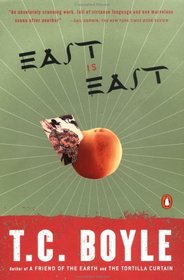Helpful Score: 3
Excellent writing, amazing vocabulary...but you need to have some good mental health because this guys stuff is dark. Not for the weak of heart.
Helpful Score: 1
I found this book to be thoroughly enjoyable from the first paragraph to the very last word. It was an easy read and a fun story but still had depth. It's the story of searching for one's identity and place in the world, of prejudice and preconceived notions, of misunderstandings. Hiro Tanaka is born in Japan to a Japanese mother and a white father who abandoned them before he was born. As a half-breed he is never accepted in Japan, so at the age of 20 he decides to get a job as a cook on a ship bound for America, where he has heard they will accept anyone. Unfortunately, things go badly and he ends up jumping ship off the coast of Georgia, finally coming to shore on swampy, confusing Tupelo Island. Meanwhile, Ruth Dershowitz is an aspiring author at an artist's colony on the island struggling to make her mark on the world. Their paths intertwine. I really enjoyed the way the story was told from the points of view of different characters--from the main characters to minor characters to very minor characters--which helped explain all of the misunderstandings and how even though everyone has good intentions, bad situations can still occur. A great story. I'd love to read more by this author.
Helpful Score: 1
One of the better novels you will find about Japanese in Georgia.
Helpful Score: 1
It has been years since I read this and I don't remember it in much detail. I remember that it was quite unusual. Amazon readers give it 4 stars.
From Library Journal
Offspring of a young Japanese woman and a spaced-out American hippie briefly entranced with Japan, Hiro Tanaka grows up scorned as a half-breed in his racially pure homeland. So when he nears America aboard the sailing vessel on which he serves as cook's assistant, Hiro literally jumps ship. He's sure that in America a man of mixed race can easily fit in, but he's in for a big surprise. Landing on Tupelo Island near Georgia, he inadvertently frightens a number of witless residents and thus finds himself a hunted man. He is briefly protected by Ruth Dershowitz, a resident at a writers' colony on the island, but her motives are mixed: she's mostly interested in Hiro as an experience that will enhance her writing and highly developed sense of self. Indeed, virtually everyone in this picaresque novel acts primarily from self-interest; even our Hiro comes across as something of an anti-hero, self-pitying if vulnerable. Boyle's lucid prose charges ahead wrecklessly, sweeping readers along as it effortlessly blends the story of Hiro's plight with that of the writers' colony. But Boyle's unrelieved indictment of prejudice at times seems one-dimensional, his characters so bigoted, foolish, or otherwise unengaging that we are left longing for some sign of human dignity. Previewed in Prepub Alert, LJ 4/15/90.
From Library Journal
Offspring of a young Japanese woman and a spaced-out American hippie briefly entranced with Japan, Hiro Tanaka grows up scorned as a half-breed in his racially pure homeland. So when he nears America aboard the sailing vessel on which he serves as cook's assistant, Hiro literally jumps ship. He's sure that in America a man of mixed race can easily fit in, but he's in for a big surprise. Landing on Tupelo Island near Georgia, he inadvertently frightens a number of witless residents and thus finds himself a hunted man. He is briefly protected by Ruth Dershowitz, a resident at a writers' colony on the island, but her motives are mixed: she's mostly interested in Hiro as an experience that will enhance her writing and highly developed sense of self. Indeed, virtually everyone in this picaresque novel acts primarily from self-interest; even our Hiro comes across as something of an anti-hero, self-pitying if vulnerable. Boyle's lucid prose charges ahead wrecklessly, sweeping readers along as it effortlessly blends the story of Hiro's plight with that of the writers' colony. But Boyle's unrelieved indictment of prejudice at times seems one-dimensional, his characters so bigoted, foolish, or otherwise unengaging that we are left longing for some sign of human dignity. Previewed in Prepub Alert, LJ 4/15/90.
Helpful Score: 1
Not my favorite of Boyle's long fiction (because it dragged a little at the end), but still a very good satire. Living in a town of "yuppies"--much like the people who inhabited the artists colony--the book especially rang true for me.





![header=[] body=[Get a free book credit right now by joining the club and listing 5 books you have and are willing to share with other members!] Help icon](/images/question.gif?v=90afaeb39)
